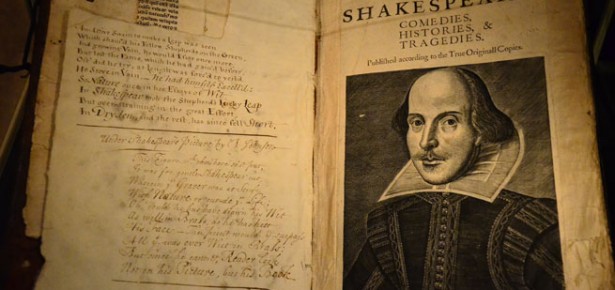
The most-studied book in the world must be Mr William Shakespeares Comedies, Histories, & Tragedies, a collection of thirty-six plays first published in London in 1623 and now known as the First Folio. Every single one of its nine hundred pages – even every single piece of type on every page – has been minutely examined for what we can learn about early modern printing and publishing practices, about Shakespeare’s lost manuscripts, about theatrical conventions, and about later readers and owners of this iconic book.
Because of the cultural status of the First Folio, it has often provided test-case material for new technologies. In the nineteenth century, the Ordnance Survey mapping service produced a page from King John to gain political support for its new process of photo-lithography; in the twenty-first, one university joined iTunes with a digital version of the First Folio texts. Digital technology has, in fact, made the First Folio more available to interested readers than it has ever been. As digital scholar Sarah Werner (http://sarahwerner.net/blog/digitized-first-folios) discusses in the new Cambridge Companion to Shakespeare’s First Folio, there are now over a dozen digitised copies of this book from universities and rare book libraries from Pennsylvania (http://sceti.library.upenn.edu/sceti/printedbooksNew/index.cfm?textID=firstfolio&PagePosition=1) to Japan (http://shakes.meisei-u.ac.jp/e-index.html) and from New South Wales (http://internetshakespeare.uvic.ca/Library/facsimile/book/SLNSW_F1/), to St-Omer (http://www.purl.org/yoolib/bmsaintomer/19039).
Just as the First Folio itself comes with built-in book technology – a table of contents, running headers, page numbers (not always accurate) – so too digitized First Folios need navigational aids. Approaching the range of online facsimile texts, Werner identifies different solutions to the problem of finding your way through this large text. Does the interface allow us to drop into the beginning of a specific play? Does it use the standard lineation developed by the bibliographer Charlton Hinman in 1968 for a print facsimile published by Norton? Does an online Folio make cross-referencing with a modern edition easier by tagging the pages with the act, scene and line numbers that are now conventional in Shakespeare citation?
Since at least the late eighteenth century, owning a First Folio has been aspirational: wealthy American collectors in the early twentieth century, especially Henry Folger, transformed the market in their eagerness to acquire more and better copies. So who owns, or can reuse, those Folios put online? Different licensing and copyright restrictions operate across these different digital objects, reimagining for the twenty-first century some of the proprietory questions which gave the Folio such high value in the first place.
These most modern manifestations of an early modern book thus raise new versions of old questions about the use, purpose, and ownership of Shakespeare’s First Folio across the centuries. The Bodleian Library in Oxford received its copy of the First Folio from the Stationers’ Company early in 1624, but by the mid-century it had gone – perhaps replaced by a later edition. In 1905 a large public fund-raising campaign was mounted to get the book back – and keep it from heading west into Folger’s collection. A century later the library launched another fund-raising campaign: to digitise the book and make it freely available online (firstfolio.bodleian.ox.ac.uk). Part of the accompanying website includes comments from donors on why Shakespeare matters to them (http://shakespeare.bodleian.ox.ac.uk/the-project/supporters/). It’s a striking way in which the history of the book and the history of its readers are intertwined: is this First Folio ‘Shakespeare’s’? The Bodleian’s? Or whose?
Latest Comments
Have your say!